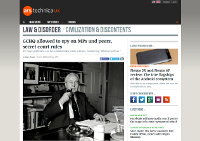
The Investigatory Powers Tribunal (IPT), the UK body that hears complaints about intelligence agencies, has ruled that the communications of MPs and peers are not protected by the Wilson Doctrine, which was thought to exempt them from surveillance by GCHQ and other intelligence agencies. Back in July, the UK government had already admitted that the Wilson Doctrine “cannot work sensibly” when mass surveillance is taking place, but today’s decision goes further by explicitly rejecting the idea of any formal immunity from spying. […]
The IPT justified its decision on the grounds that “MPs’ communications with their constituents and others are protected, like those of every other person, by the statutory regime established by Part 1 of RIPA 2000.” But as Ars has noted before, the Regulation of Investigatory Powers Act (RIPA) is a creaking legal framework for surveillance that was drawn up in the early days of the Internet as a widely-used medium, and is woefully inadequate for regulating GCHQ today when its aim is to track every visible user on the Internet. Saying that UK politicians have the same protections as anyone else may be true, but those protections are so weak as to be useless, as Edward Snowden’s revelations have made abundantly clear. […]
http://arstechnica.co.uk/tech-policy/2015/10/gchq-allowed-to-spy-on-mps-and-peers-secret-court-rules/

